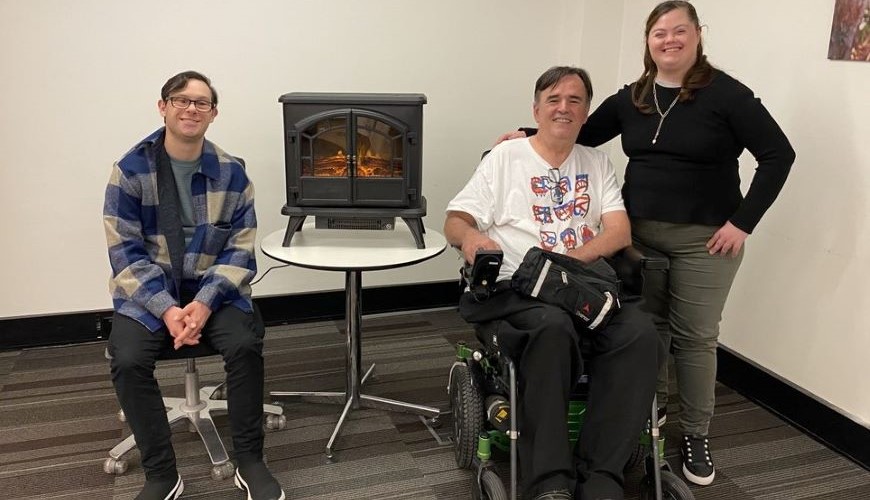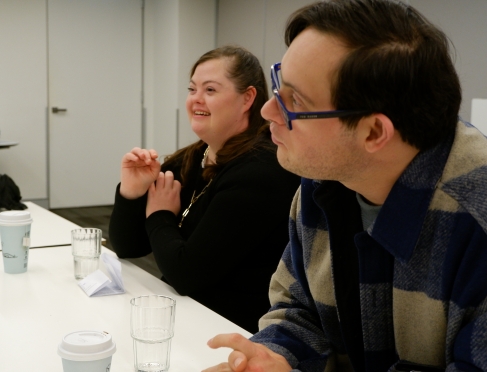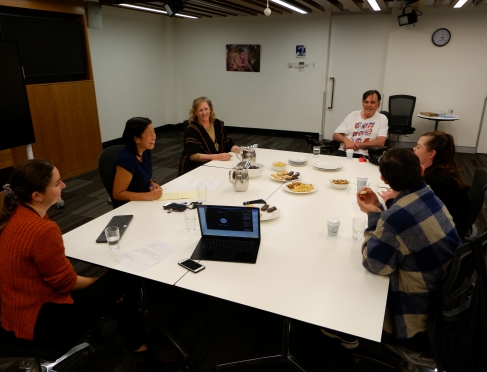The Entertainers Fireside Chat

IncludeAbility’s second Fireside Chat took place with IncludeAbility Ambassadors and entertainers Audrey O’Connor, Nathan Basha and Tim Ferguson.
IncludeAbility’s second Fireside Chat took place with IncludeAbility Ambassadors Audrey O’Connor, Nathan Basha and Tim Ferguson, who are all involved in the entertainment industry. Audrey is an actor, filmmaker, screenwriter, and author; Nathan is a motivational speaker, filmmaker, and advocate; and Tim Ferguson is a comedian, film director, screenwriter, author, and screenwriting teacher.
Our Ambassadors discussed what meaningful employment looks like and how this is reflected in the entertainment industry, what barriers still exist, and what other industries can learn from this sector.
What has it meant to be an IncludeAbility Ambassador?
Audrey said that for her she loves helping people with disabilities, and she is thankful for the opportunity to contribute to the IncludeAbility Woolworths Good Sammy Pilot Employment Project and “to give my advice and experience to help to make it easier for people with disability to fit in at work.”
Nathan agreed. He has always loved advocacy and networking. Being an IncludeAbility Ambassador is important because “it is helping ordinary everyday people because everyone needs to have a job.”
Tim discussed that IncludeAbility provides a centre for information and resources for the employment of people with disability, where previously, this had not been the case. “It is a focus point, which is great because it gives employing people with disability so much weight and reflects how important it is.”
The Ambassadors agreed that being an Ambassador for IncludeAbility allowed them to further advocate for employment for people with disability as a core human right.
The Entertainment Industry and Collaborating with People with Disability
The Ambassadors said the entertainment industry is a great starting point for attitude changes. Tim spoke about his personal experiences, where people have been dismissive of him, mainly because they had not had experience with people with any kind of disability previously. He continued,
“There needs to be familiarity, which can come from visibility and engagement, getting people in front of their faces so they can see we can do anything.”
In the entertainment industry, creativity is essential. Tim said,
“People are always after a unique perspective when it comes to creativity. People with any kind of disability will have a different way of looking at things, bringing a fresh perspective. Everyone has something to contribute.”
Audrey and Nathan are Bus Stop Films Ambassadors and have seen the significance of having people with disability at every stage of the filmmaking process.
What are the barriers to meaningful employment opportunities in the entertainment sector?
Audrey and Tim spoke about the importance of visibility. Audrey said, “We are still getting away with not being included in mainstream TV, advertising, and films. Not being seen makes it okay for people to dismiss us.”
All three entertainer Ambassadors are working towards a more prominent place for people with disability in the entertainment industry. Tim mentioned visibility, particularly when using humour, is a way to change how people think and see and that “if people with disability are finding fun in life, maybe they can offer more.” This will have a flow-on effect creating more meaningful employment opportunities where people’s strengths are prioritised.
Nathan discussed the importance of convincing organisations that employing people with disability is a good thing.
“The businesses are contributing to society by giving people with disability a chance, an opportunity. They may even change the status quo.” Organisations changing their attitudes is vital as “there are a lot of people with a disability out there that really want to work, have a job, have a life and pay the bills.” Nathan encourages businesses to reach out to them and invite them in, as it just makes “good business sense”.
What steps can be taken to make positive changes in the employment of people with disability?
Nathan said it is about looking at the person with disability as a person, “adjusting mindsets to get used to people with disability in society and in general. Thinking about how we can help support this person, how can we make this more accessible for this person, put the person first and leave the disability out.” Nathan mentioned the importance of taking that first positive step, “it is like the butterfly effect. All we can do is one ripple, and then other people feel it, creating another ripple. When it is a positive ripple, then you get a positive result. Before you know it, you can have a whole ocean full of ripples.”
Audrey said it is important to recognise that “everyone is different. And we live in this diversity world, and I realised that people with disabilities should be more included in the world because we belong to this world.”
Tim noted that there is an underestimation of what people with disability can do, leaving people with disability out of the discussion. “People with disability have already thought through solutions to problems. We have already overcome it in the past. Someone just needs to ask us.” The more people with disability are employed, there more people will realise “it really doesn’t make any difference.” He highlighted the importance of training and internships for all sorts of people where they can learn various skills, and this works to familiarise people in all sorts of industries with people with disability.
The Ambassadors agreed that instead of employers being fearful of employing someone with disability, employers should give someone a chance, teach them, and support them. Tim said, “You would probably get more if you hired a person with a disability or work with them because they will work harder and longer.”



